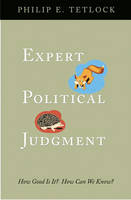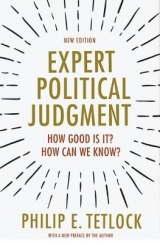
Expert Political Judgment
Princeton University Press (Verlag)
978-0-691-12871-9 (ISBN)
- Titel erscheint in neuer Auflage
- Artikel merken
The intelligence failures surrounding the invasion of Iraq dramatically illustrate the necessity of developing standards for evaluating expert opinion. This book fills that need. Here, Philip E. Tetlock explores what constitutes good judgment in predicting future events, and looks at why experts are often wrong in their forecasts. Tetlock first discusses arguments about whether the world is too complex for people to find the tools to understand political phenomena, let alone predict the future. He evaluates predictions from experts in different fields, comparing them to predictions by well-informed laity or those based on simple extrapolation from current trends. He goes on to analyze which styles of thinking are more successful in forecasting.
Classifying thinking styles using Isaiah Berlin's prototypes of the fox and the hedgehog, Tetlock contends that the fox--the thinker who knows many little things, draws from an eclectic array of traditions, and is better able to improvise in response to changing events--is more successful in predicting the future than the hedgehog, who knows one big thing, toils devotedly within one tradition, and imposes formulaic solutions on ill-defined problems. He notes a perversely inverse relationship between the best scientific indicators of good judgement and the qualities that the media most prizes in pundits--the single-minded determination required to prevail in ideological combat. Clearly written and impeccably researched, the book fills a huge void in the literature on evaluating expert opinion. It will appeal across many academic disciplines as well as to corporations seeking to develop standards for judging expert decision-making.
Philip E. Tetlock is Mitchell Professor of Leadership at the University of California, Berkeley. His books include "Counterfactual Thought Experiments in World Politics" (Princeton).
Acknowledgments ix Preface xi Chapter 1: Quantifying the Unquantifiable 1 Chapter 2: The Ego-deflating Challenge of Radical Skepticism 25 Chapter 3: Knowing the Limits of One's Knowledge: Foxes Have Better Calibration and Discrimination Scores than Hedgehogs 67 Chapter 4: Honoring Reputational Bets: Foxes Are Better Bayesians than Hedgehogs 121 Chapter 5: Contemplating Counterfactuals: Foxes Are More Willing than Hedgehogs to Entertain Self-subversive Scenarios 144 Chapter 6: The Hedgehogs Strike Back 164 Chapter 7: Are We Open-minded Enough to Acknowledge the Limits of Open-mindedness? 189 Chapter 8: Exploring the Limits on Objectivity and Accountability 216 Methodological Appendix 239 Technical Appendix: Phillip Rescober and Philip E. Tetlock 273 Index 313
| Erscheint lt. Verlag | 20.8.2006 |
|---|---|
| Zusatzinfo | 39 line illus. 7 tables. |
| Verlagsort | New Jersey |
| Sprache | englisch |
| Maße | 152 x 235 mm |
| Gewicht | 482 g |
| Themenwelt | Geisteswissenschaften ► Psychologie ► Sozialpsychologie |
| Sozialwissenschaften ► Politik / Verwaltung ► Politische Theorie | |
| ISBN-10 | 0-691-12871-5 / 0691128715 |
| ISBN-13 | 978-0-691-12871-9 / 9780691128719 |
| Zustand | Neuware |
| Haben Sie eine Frage zum Produkt? |
aus dem Bereich



